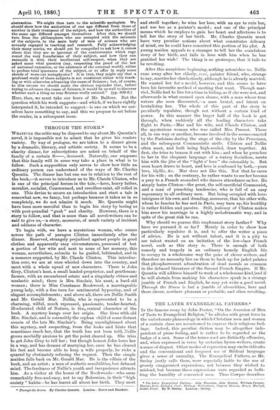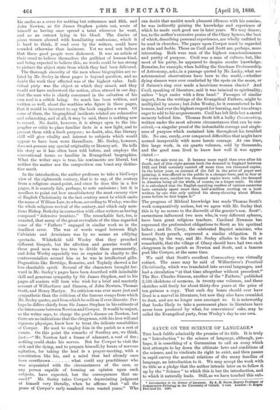THE LATER EVANGELICAL FATHERS.*
Is the famous essay by John Foster, "On the Aversion of Men of Taste to Evangelical Religion," he alludes with great force to the unfortunate phraseology in which Christian men and women of a certain class are accustomed to express their religious feel- ings. Indeed, this peculiar diction may be altogether inde- pendent of pious feeling, and is rather to be regarded as the badge of a sect. Some of the terms used are distinctly offensive, and, when expressed in verse by sectarian hymn-writers, create a sense of disgust. Other modes of expression may excite ridicule, and the conventional and frequent use of Biblical language gives a sense of unreality. The Evangelical Fathers, as Mr. Seeley justly calls them, were especially liable to the use of grossly exaggerated expressions, not because they wished to mislead, but because these expressions were regarded as befit- ting the humility of converted men. Thus Cowper describes • The Later Evangelical Fathers: John Thornton, John Newton, William Cowpwr, Thomas Scott, Richard Cecil, William Wilberforce, Charles Simeon, lienry Marlyn, Josiah Pratt. By M. Seeley. London : Seeley.
his smiles as a cover for nothing but rottenness and filth, and John Newton, as Sir James Stephen points out, wrote of himself as having once spread a taint wherever he went, and as an outcast lying in his blood. The diaries of pious women abound with humiliating confessions, which it is hard to think, if read over by the writers, could have sounded otherwise than insincere. Yet we need not believe that these good people were dishonest. It was an article of their creed to believe themselves the guiltiest of human-kind, and being expected to believe this, no words could be too strong to picture the abject state from which they had been delivered.
The thorough sincerity of the men whose biographies are re- lated by Mr. Seeley in these pages is beyond question, and no doubt the work they effected was of the highest value. Indi- vidual piety was the object at which they aimed, and they would not have understood the notion, often uttered in our day, that the man who is chiefly concerned in the salvation of his own soul is a selfish being. So much has been written, and written so well, about the worthies who figure in these pages, that it would be incorrect to say the book supplies a want. Of some of them, the biographical incidents related are exhaustive and exhausting, and of all, it may be said, there is nothing new to record. No doubt, however, it is always open to the bio- grapher or critic to place familiar facts in a new light, and to present them with a fresh purpose ; no doubt, also, fine literary skill will give vitality and interest to subjects which would appear to have been worn threadbare. Mr. Seeley, however, does not possess any special originality or literary art. He tells his story as it has often been told before, and employs the conventional terms so familiar in Evangelical biographies. What the writer says is true, his sentiments are liberal, but neither the matter nor the composition can boast any distinc- tive merit.
In the introduction, the author professes to take a bird's-eye view of the eighteenth century, that is to say, of the century from a religious stand-point, and since he does this in a few pages, it is scarcely fair, perhaps, to note omissions ; but it is needless to point out how unsatisfactory the most cursory view of English Christianity in the last century must be which omits the name of William Law, to whom, according to Wesley, was due the whole religious revival of the century, and which only men- tions Bishop Berkeley in connection with other writers as having composed "defensive treatises." The remarkable fact, too, is unnoted, that many of the great revivalists of the time regarded some of the " Fathers " engaged in similar work as in the deadliest error. The war of words waged between High Calvinists and Anninians was by no means an edifying spectacle. Whitefield told Wesley that they preached different Gospels, but the affection and genuine worth of these good men was too true to divide them permanently, and John Wesley especially was as superior in charity to the controversialists around him as he was in intellectual gifts. Dogmatists like Benidge, Romaine, and Toplady showed a far less charitable spirit. Several of the characters brought for- ward in Mr. Seeley's pages have been described with inimitable skill and generous sympathy by Sir James Stephen, and to his pages all readers will turn who wish for a brief and masterly account of Wilberforce and Simeon, of John Newton, Thomas Scott, and Henry Martyn. No criticism was ever more just and sympathetic than the criticism of the famous essays from which Mr. Seeley quotes, and from which he seldom if ever dissents. Per- haps he differs chiefly from Sir James Stephen in his estimate of the intercourse between Newton and Cowper. It would be unjust, as the writer says, to charge the poet's disease on Newton, but there are no indications that the clergyman, with his iron will and vigorous physique, knew how to treat the delicate sensibilities of Cowper. He used to employ him in the parish as a sort of curate. On this point the remarks of Southey are, we think, just:—" Mr. Newton had a frame of adamant, a soul of fire ; nothing could shake his nerves. But for Cowper to visit the sick and the dying, and to prepare himself,by hours of nervous agitation, for taking the lead in a prayer-meeting, with a constitution like his, and a mind that had already once
been overthrown what could any practitioner who was acquainted with the circumstances of the case, or any person capable of forming an opinion upon such subjects, have expected, but the consequences that en- sued ?" Mr. Seeley takes Cowper's depreciating judgment of himself very literally, when he affirms that "all the years of Cowper's early manhood were wasted years." Who can doubt that amidst much pleasant idleness with his cousins, he was indirectly gaining the knowledge and experience of which he made such good use in later years. We may demur,. too, to the author's excessive praise of the Olney hymns, the best of which, describing personal experiences, are wholly unfitted to be used in churches. The paper upon Cowper must be regarded as thin and feeble. Those on Cecil and Scott are, perhaps, more interesting. Both were men of the highest conscientiousness and purity of purpose. Cecil was a man of culture, but, like most of his party, he appeared to despise secular knowledge.
Romaine, for example, when holding the Gresham Professorship of Astronomy, asks, in a passage quoted by Mr. Lecky, what use- astronomical observations have been to the world,—whether dying sinners were ever comforted by the spots on the moon, or if Saturn's ring ever made a lascivious woman chaste P And Cecil, speaking of literature, said it was inimical to spirituality,. unless "kept under with a firm hand." Passages of similar import, from the writings of the Evangelical Fathers, might be- multiplied by scores ; but John Wesley, be it remembered to his. honour, had ever the highest respect for learning, and was always eager to add to his acquirements. Cecil has left little but a sacred memory behind him. Thomas Scott left a bulky Commentary,.
written under the most adverse circumstances that can be con- ceived,—a singular proof of the indomitable courage and single- ness of purpose which sustained him throughout his troubled life. No one, surely, ever conquered difficulties that might have seemed insuperable with more heroic courage. At one time, this large work, in six quarto volumes, sold by thousands,. and the good man lived to know how well it was appre- ciated :—
" So the sale went on. It became more rapid than ever after his death, and of this eight-guinea book the demand in England between 1821 and 1845 certainly carried off more than ten thousand copies. In the latter year, on account of the fall in the price of paper and printing, it was offered to the public in a cheaper form, and in four or five years more, another ten thousand copies were sold, the demand' in America being all the while, of course, on a larger scale. So that, it is calculated that the English-speaking readers of various countries have certainly spent more than half-a-million sterling on a book written by one who only quitted his sheep-shearing about fifteen years before he first began it."
The progress of Biblical knowledge has made Thomas Scott's work comparatively useless, but we agree with Mr. Seeley that this is by no means to the discredit of the grazier's son. Scote:I. earnestness influenced two men who, in very different spheres,. have been great religions teachers. Cardinal Newman has expressed the profoundest obligations to Scott as his spiritual father ; and Dr. Carey, the celebrated Baptist minister, who heard Scott preach, expressed a similar obligation. It is strange, by the way, and Mr. Seeley alludes to the fact as remarkable, that the village of Olney should have had two such clergymen in the parish as Newton and Scott, and a famous poet like Cowper, at the same time.
We said that Scott's excellent Commentary was virtually extinct. The same may he said of Wilberforce's Practical Christianity, which was translated into several languages, and had a circulation "at that time altogether without precedent.' The Rev. Charles Simeon, another of the "Fathers," published 2,536 skeletons of sermons, in twenty-one volumes, and these sketches sold freely for about thirty-five years at the price of ten guineas a copy. That such dry bones should ever have lived is a marvel in literature, but now they also have crumbled to dust, and are no longer seen amongst us. It is noteworthy that books likely to take a permanent place in literature have never been produced by what, for convenience' sake, may be. called the Evangelical party, from Wesley's day to our own.



































 Previous page
Previous page